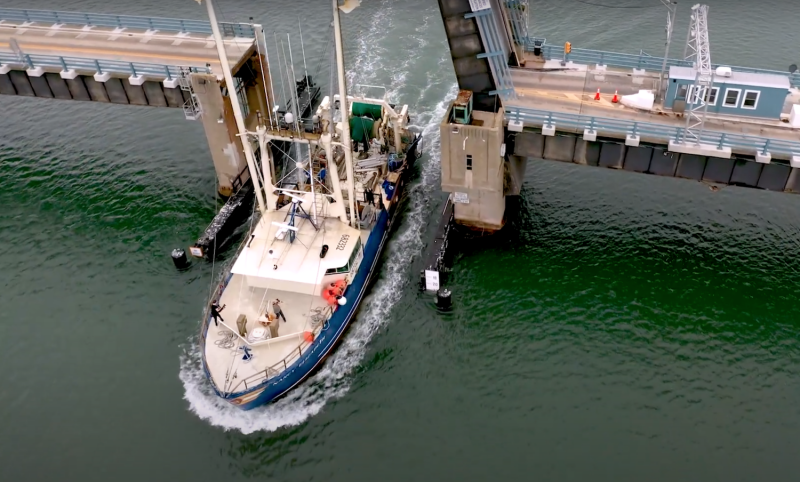The U.S. Supreme Court announced it will hear an appeal from Cape May, N.J. fishermen who are challenging a National Marine Fisheries Service rule that required them to pay for at-sea observers on their boats.
NMFS suspended the program in April, saying it had run out of money to pay its own administrative costs. But the fishermen pressed ahead on asking the high court to review the lawsuit, now known to the courts as Loper Bright vs. Raimondo, saying they want to prevent mandatory monitoring payments from returning in the future.
Lead plaintiff Bill Bright of Loper Bright Enterprises and other Cape May fishermen are represented by the Cause of Action Institute, a legal foundation in Arlington, Va., that calls itself a “non-profit working to enhance individual and economic liberty by limiting the power of the administrative state to make decisions that are contrary to freedom and prosperity by advocating for a transparent and accountable government free from abuse.”
“We are grateful to the Supreme Court for taking our case. Our way of life is in the hands of these justices, and we hope they will keep our families and our community in mind as they weigh their decision,” Bright said in a statement issued by Cause for Action after the court’s announcement Monday.
Led by Paul Clement, who was U.S. solicitor general, and the top executive branch lawyer during the George W. Bush administration, the legal team is aiming to attack a legal doctrine known as the “Chevron deference.”
Dating from a 1984 Supreme Court ruling on air pollution regulations, the principle laid out then by the high court held that federal courts can use a legal test to determine when they should “defer” to a federal agency’s interpretation of law, in absence of specific direction from Congress.
“The Supreme Court has an opportunity to correct one of the most consequential judicial errors in a generation. Chevron deference has proven corrosive to the American system of checks and balances and directly contributed to an unaccountable executive branch, overbearing bureaucracy, and runaway regulation,” Cause of Action Institute counsel Ryan Mulvey said after the court agreed to hear the case.
Nearly 40 years after its namesake court case, the Chevron deference is a cause célèbre in conservative legal circles. Amicus ("friend of the court") briefs in support of the fishermen’s case were filed by 38 organizations and individuals, including one signed by 18 state attorneys general.
One of those amicus briefs was filed by the New Civil Liberties Alliance, on behalf of Rhode Island fishermen it represents. The NCLA has also represented Gulf of Mexico charter fishing captains who object to NMFS electronic monitoring demands.
“It is thrilling news that the Court may be looking to remove or roll back Chevron deference…because it’s been 40 years since the Magnuson-Stevens Act has been taken up by the Court,” said John J, Vecchione, senior litigation counsel for NCLA.
“As we argued in our amicus brief, this has left the fishing industry at the mercy of regulators anywhere courts decide to defer rather than enforce the best reading of the statute passed by Congress.”
NMFS moved in 2020 to make herring fishermen pick up the tab for carrying at-sea monitors to observe the fishery, at a cost of up to $700 a day according to the captains. The fishermen lost their case in lower courts – but their lawyers, and other industry groups, still see this last appeal as an opportunity to reverse the Chevron deference principle.
U.S. Department of Justice lawyers defending against the fishermen’s lawsuit describe the decades-old Chevron case law as “principles to determine the extent to which a court reviewing agency action should give deference to the agency’s construction of a statute that the agency has been delegated to administer.”
While NMFS says it had to charge observer costs to fulfill its Congressional mandate to manage fisheries, the lawsuit contends the agency lacked specific authority from Congress to impose the fee.
“If Congress didn’t put it in there, Congress didn’t want to,” Clement said in a Cause for Action video in late 2022. While the fishermen lost their last case in a 2-1 split decision by the District of Columbia Circuit Court of Appeals, there is a chance “Chevron is on life support,” said Clement.
In his dissent in that case, appellate Judge Justin Walker wrote that “Congress can make profitable fishing even harder by forcing fishermen to spend a fifth of their revenue on the wages of federal monitors embedded by regulation onto their ships. But until Congress does that, the Fisheries Service cannot.”
Conservative legal analysts have seen that as a signal that the Chevron deference will come in for close scrutiny at the Supreme Court. The Cause for Action Institute noted that “critically, the Court granted only on Question Presented 2, which means it will directly address the future of Chevron.”
The question asks:
“Whether the Court should overrule Chevron or at least clarify that statutory silence concerning controversial powers expressly but narrowly granted elsewhere in the statute does not constitute an ambiguity requiring deference to the agency.”
The Cause for Action lawyers argue the Chevron rule “has allowed Congress to outsource lawmaking to executive agency employees. That standard has all but guaranteed government victories in regulatory cases by giving unelected bureaucrats carte blanche for rulemaking without congressional approval.”
NMFS had no authority from Congress to mandate herring fishermen pay for at-sea monitors, but went ahead and imposed that requirement through its own rulemaking system, Clement and his legal team say.







